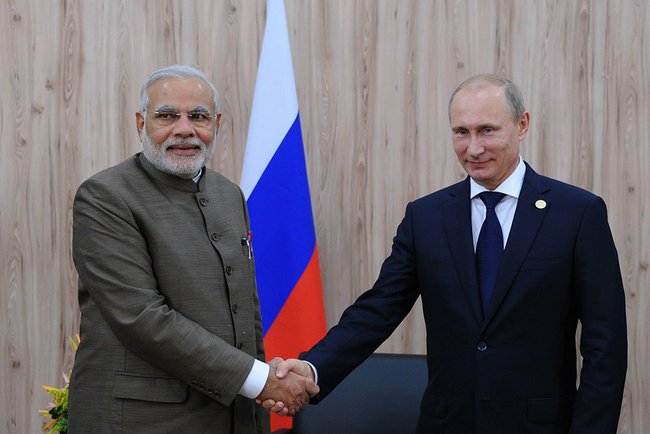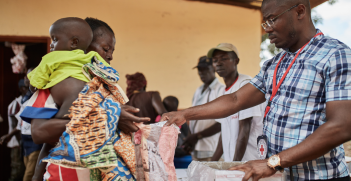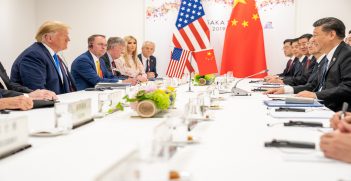Mr Putin Goes to India

The Russian President’s recent visit is reinvigorating the India-Russia strategic partnership.
On 11 December 2014 President Vladimir Putin visited India to commemorate the 15th Annual India-Russia Summit level meeting. This was his first visit to India since the Narendra Modi-led BJP government came to power. Both leaders signed 20 agreements to advance their special partnership to qualitatively new levels. The agreements demonstrated a strong focus on enhancing their economic and defence partnership.
Putin’s reinvigoration of a long-standing friendship with India is significant amidst severe strains in Russia’s relations with the US and the West. From India’s perspective Modi’s government has sought to pursue a multi-pronged foreign policy approach towards the world’s major powers and Russia continues to hold privileged partnership status.
Indo-Soviet Ties: The Cold War Dynamics
The India-Russia bond dates back to the Cold War era. The US’s refusal to help India with high-tech weapons in the wake of the Sino-India border war in 1962 combined with Pakistan’s military alliance with the US and the US-Sino Shanghai communiqué pushed India towards the Soviet Union. Russian military and financial aid flowed freely to New Delhi and both signed the Indo-Soviet Treaty of Friendship and Cooperation in August 1971. Eventually, Russia became the main defence supplier for India, constituting almost 80% of the Indian armoury.
Enhancing Economic Ties
Russia, adversely affected by Western sanctions over the Ukraine crisis, currency difficulties and plunging oil prices is turning its attention to Asia; Russia recently signed energy deals with China to revive its economy. On the Indian side Modi’s government is obviously faced with huge expectations to fix the economy and make India a hub for manufacturing through its ‘Make in India’ campaign. Russia and India are keen on increasing bilateral trade from its current level of $10billion; Russia-India trade is below its potential and 10 times less than the total trade volume between Russia and China.
The main agreements signed between Russian and Indian state-controlled entities include; Rosatom and the Nuclear Power Corporation of India Limited to construct 10 nuclear reactors in India; a preliminary agreement between Rosneft and India’s ESSAR to ship around 10 million tons of oil to India; a MoU between Russian Zarubezhneft and Oil India; and possible cooperation between Gazprom and India’s GAIL concerning the delivery of Russian liquefied natural gas. Both nations also agreed on a joint investment fund of $1billion for Indian infrastructure and hydroelectric projects and an increase in direct diamond sales to India.
That India is potentially the world’s biggest energy market figures prominently in Russian minds and New Delhi is not averse to the deals given its appetite for energy.
Defence Ties: No Major Defence Deals
Contrary to expectations, there was only one significant defence deal included in discussions; the possible joint production in India of one of Russia’s most advanced helicopters.
In recent years India-Russia defence ties have not been particularly warm; Russia has been upset over India’s shift towards the US, EU and Israel for defence acquisition, for example its decision to buy French Rafale fighters and U.S.-made Apache helicopters. The US has become the biggest defence supplier to India in the last two years. India, for its part, has found fault in the quality of Russian arms. Another development that has the potential to hamper closer relations is Russia’s decision to sell attack helicopters to Pakistan. Though nothing concrete has materialised, for India’s peace of mind, Russia has pledged that the deal with Pakistan will be not be at the expense of India’s security.
However, despite India’s diverse range of defence suppliers, Russia continues to have a 60% share in the Indian defence market. Modi stated that, “Even as India’s options have increased today, Russia will remain our most important defence partner,” and Putin responded that Russia would participate in Modi’s ‘Make in India’ campaign in the defence sector.
The Complexities of The Great Power Game
After the demise of the Soviet Union the nations of the world began to reposition themselves in the new international structure dominated by the US. India reformulated its foreign policy towards the US; freed from the ideological baggage of the Cold War, India pursued a multi-pronged foreign policy approach and has been able to maintain relationships with both the US and Russia.
In the wake of 9/11 Russia and the US converged on the issue of terrorism and Moscow supported the US in its war on terrorism. However, the standoff over the crisis in Syria, Russia’s annexation of Crimea and their support of the pro-separatist movement in Ukraine has brought Russia into confrontation with the US and the West. Though India’s deepening strategic partnership with the United States is no longer seen through the prism of Cold War dynamics, the US-Russia logjam has created unease for India. Despite the strains, India, a partner of Russia in the BRICS group of emerging-market economies, has refused to support any US and EU backed sanctions towards Moscow.
Furthermore, India is concerned about Russia’s improving relationship with China and it fears sanctions might push them closer; a strong Russia-China partnership would not be strategically favourable for either India or the US. . India’s support of Russian sanctions would add to the unease in India-Russia ties due to a reduced Russian share in India’s defence market.
The global situation is a complex one; the US and Russia can’t afford another Cold War. The US also has strategic challenges greater than Russia, such as the rise of China, and global security threats including environmental security and terrorism.
Today a nation can have good relations with multiple countries even when they disagree on certain issues. The interdependence and the strategic complexities of world politics do not allow nations to have exclusive alliances. While India is becoming closer to the US, Australia and the West, its special relationship with Russia can help it play a positive role in reducing global tensions; similar to the non-aligned position that India took during the Cold War era.
Dr Ashok Sharma is an Honorary Academic in Politics and International Relations at the University of Auckland and Deputy Chair of New Zealand Institute of International Affairs, Auckland Branch.





